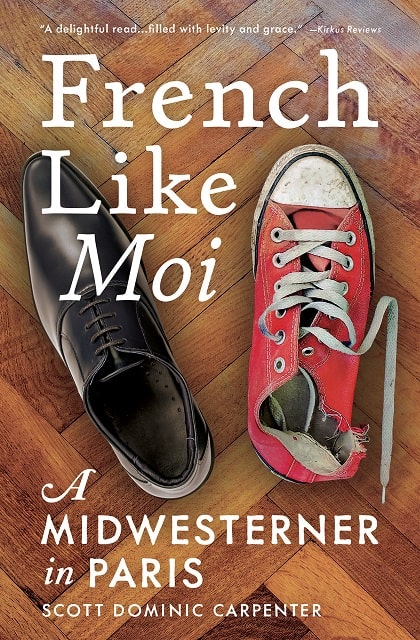Book Review: French Like Moi, A Midwesterner in Paris
- SUBSCRIBE
- ALREADY SUBSCRIBED?
BECOME A BONJOUR PARIS MEMBER
Gain full access to our collection of over 5,000 articles and bring the City of Light into your life. Just 60 USD per year.
Find out why you should become a member here.
Sign in
Fill in your credentials below.
Early on in French Like Moi: A Midwesterner in Paris, Scott Dominic Carpenter explains the reason for the series of adventures and misadventures that he and his family experienced as a result of his desire—his wife might say obsession—to buy an apartment in Paris.
As a kid my parents had dragooned me into French classes, and when this prepared me for no other career, I was dragooned into teaching the same language to other poor saps, ones who would eventually be dragooned into their own slot in the vicious cycle we call education. To polish my credentials, I’d been dragooning my family for extended stays here for years, lodging us in rat traps, each more squalid than the last…

Parisian apartments. © Jordan Plihal, Unsplash
Despite the irreverent tone, this is not only a humorous and distinctly unromantic view of life in the “City of Light,” it is also yet another love letter to France and the French. However, it is one that does not shrink from exposing their foibles while appreciating their strengths, and the various kinds of beauty, and pleasure, that are to be found everywhere in France.
The book is a collection of essays, many of which were published before in other places, often in slightly different forms. It is organized into three sections: Came/Saw/Conquered, and I am not too sure, but I think it is an open question who or what has been conquered in the end—Paris? Or the author?

Paris, from the Eiffel Tower. © Flicker, (CC BY 2.0)
It doesn’t really matter. What matters is that this is a lively romp through many of the situations that “foreigners” in Paris encounter. (Why is it that we so balk at seeing ourselves as foreigners? That is what we are when we are in another country, after all. But I digress…) Each of the chapters captures some aspect of the inherently comical ups and downs of dealing with the challenges of home maintenance, medical issues, visas, French education, buying things (and the more difficult task of trying to return them), and of course, the language itself.
Because the author is a teacher of French it is somewhat comforting to know that despite his advanced level of fluency in the language, there are still moments, even for him. Of one situation, where he is trying to determine whether someone has really just been complaining to him about the failure of her neighbor to die, he writes:
This kind of situation occurred with distressing frequency in Paris. I’d start a conversation on one topic only to find it veering into another. While I squinted at the butcher’s explanation about cutlets, the road would somehow fork off to plumbing. At the post office I’d be learning about air mail options, only to feel the clerk had hairpinned to the subject of Etruscan pottery. Swerves like this generally meant that I had misunderstood some crucial word, had careened off the conversational cliff, and had gone airborne for an undetermined amount of time…

Learning books on a table. © Element5 Digital, Unsplash
Carpenter is very good on cultural differences between the French and Americans, one of my favorite topics. And despite the abundance of thought that has been given to this matter by Americans through the centuries, he has new and interesting things to say, and unique ways of saying what has been said before. For example:
In France people pride themselves on what is known as the Cartesian Method. It’s a kind of problem-solving founded on the principle of suspicion. You start with a hunch that things may not be as simple as they seem, which helps you identify a problem. Then you break it into parts, prioritize the steps of your solution, and march forward in the simplest way possible.

Scott Carpenter. © Scott Dominic Carpenter
The Cartesian Method is fundamentally un-American. I, for instance, address problems the way you might swat at flies, trying to make them go away. The French prefer to dissect the fly. They strive to understand its motives. Then they try to figure out how to discourage it from pestering you.
I’m not trying to say one method is better than the other. There’s a time and place for each. When my friend Guy spends half an hour studying a wine list in a restaurant, I tend to think the French could do with a little less dissection. On the other hand, when an opportunity for geopolitical intervention presents itself, I feel my own country might do well to resist the swatting impulse.

Book on a bed. ©Sincerely Media, Unsplash
Although the essays flow fairly easily from one into the next, I recommend taking a break of at least a few minutes—ideally more—to give each of them the space in which to “expand.” It seems to me this is the kind of book that deserves to be strolled through at a leisurely pace, rather than galloped through. I tried not to read more than one or two chapters at a time, and then take a break before continuing. Because although on one level this book is light entertainment, and sometimes laugh-out-loud funny, there’s also plenty to reflect upon in its pages. And it’s worth taking the time to do so.
You can purchase French Like Moi, A Midwesterner in Paris at your favorite local independent bookstore; in Paris, you can support bookstores such as Shakespeare and Company and The Red Wheelbarrow. Or find it on Amazon here.
Lead photo credit : French Like Moi: A Midwesterner in Paris by Scott Dominic Carpenter. © Scott Dominic Carpenter
More in Illustration, Paris, review





